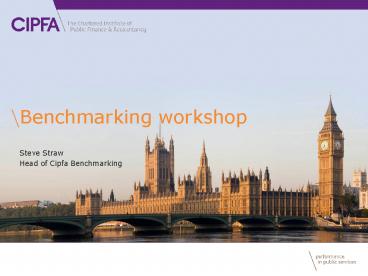Benchmarking workshop PowerPoint PPT Presentation
1 / 15
Title: Benchmarking workshop
1
Benchmarking workshop
Steve Straw Head of Cipfa Benchmarking
2
Definitions
- The continuous search for and application of
significantly better practices that lead to
superior performance by investigating the
performance and practices of other organisations
(Westinghouse) - a skill, an attitude and a practice that
ensures an organisation always has its sights set
on excellence, not merely on improvement
(McKinsey Co) - Stealing shamelessly. (Roger Milliken)
- Creative Swiping (Tom Peters)
- A process of adaptation not adoption (Watson)
3
- Bill Cockburn Formerly BT Group Managing Director
and Chief Executive W H Smith Group - I subscribe absolutely to the concept of stealing
shamelessly!..if its likely to work, pinch it
theres nothing wrong with that. - There is quite a respectable word benchmarking-
which is the same thing..
4
- Data is not your enemy it is your friend.
- You should make it your best friend!
- Clive Humby dunnhumby ltd.
5
The Governments View (1999)
- Over the next five years, we will review all
central and local government department services
and activities by consulting with users by
benchmarking and by open competition to
identify the best supplier in each case (page
40) - The public sector must become a learning
organisation. It needs to learn from its past
success and failures. It needs to consistently
benchmark itself against the best, wherever that
is found (page 56) - (The Modernising Government White Paper
1999)
6
The Governments View 2009
- All public sector organisations employing more
than 250 people must collect and publish data
using the audit agencies approved value for
money indicators for back office operations with
effect from June 2009 for central departments,
agencies and NDPBs and by December 2009 for the
wider public sector. Benchmarking information
from across the public sector should be
collected, checked and published on a regular,
consistent, auditable and transparent basis in
order to drive improved performance. - Operational Efficiency Programme final report
7
Benchmarking is about asking questions
- How well are we performing?
- Are we performing better year on year?
- How does our performance compare with other
organisations? - Can we learn from other high performers?
8
Step 1 - Select Performance Measure Step 2 -
Benchmark Current Performance Step 3 - Identify
Current Gap Step 4 - Set Target Performance Step
5 - Produce Schedule for Managed Change
Own Performance
Future gap
Current gap
Comparators Performance
Now
Future
Benchmarking Gap Analysis Model Watson 1993
9
(No Transcript)
10
The Benefits of Benchmarking
- Provides realistic and achievable targets
- Challenges operational complacency
- Creates an atmosphere conducive to continuous
improvement - Allows employees to visualise the improvement
- Creates a sense of urgency for improvement
- Confirms the need for change
- Identifies weak areas and points to improvements
11
Exercise
Calculate the cost of obtaining 10 apples and
getting them to this room. You can be as
innovative as you like
12
What did your apples look like?
13
The Pitfalls
- Not comparing like with like
- Resources required
- Poor quality data
- Just quantitative data
- League Tables
- Stifling Innovation
14
The Enemies of Benchmarking
- Fear
- Pride
- Apathy
- Ignorance
15
Success Story
- In August 2006 Hackney Council benchmarked their
accounts payable process with the Chartered
Institute of Public Finance and Accounting. We
found that we were one of the worst in the
country in terms of cost per invoice. Therein
started a journey to strip out costs, stop losing
invoices, introduce efficiencies across the P2P
process, and ensure everything was done to pay
suppliers on time. First came the mapping
exercise, where different types of invoices were
mapped in terms of their processes, and
challenged as to the way they were processed.
70,000 suppliers were consolidated into a
remarkable 3,500 and the contracts spend
increased by 65. Hackney Council is now in the
continuous improvement phase and has arrived at
an impressive 400K saving.

